Terrifying Statistics About the State of Maternal Death in America
Maternal death in America is a real issue - and hospitals seem to be avoiding the discussion.
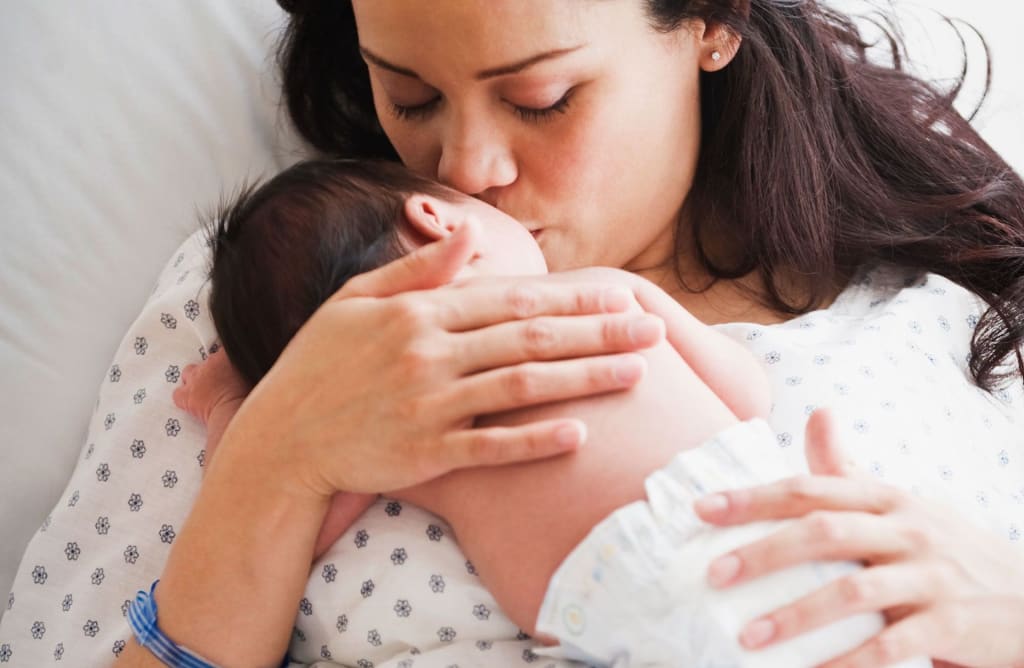
I'll begin this by saying that my pregnancy was a freak accident; I wasn't even supposed to be able to have kids. This pregnancy introduced me to the nightmare that is being pregnant in the United States.
When I found out I was pregnant with my daughter, I couldn't find a doctor willing to watch over my pregnancy. I had found out seven months in, and when they heard what my lifestyle was like, they told me I was "too high risk to help."
I remember looking at doctors, and asking them, "So, are you just going to let me die if something happens? Won't you help me? How do I even know what to do?"
"Not my problem," was the answer that I got from every single doctor I reached out to. For the first time in my life, my faith in doctors was totally gone.
It felt like I was in a crazy, bizarro version of some third world country where women's lives didn't matter. Was I in Somalia? Was I in Saudi Arabia? Was I in the Democratic Republic of the Congo? Pakistan?
No, I was in the United States of America.
I remember just going home, crying to myself that the people who were paid to help me just didn't want to bother. I debated just writing a will before I delivered. I expected to die, and I felt helpless to do anything about it.
My delivery was one that was an extremely high risk and came with typically lethal post-birth complications. I almost bled to death a month after my daughter was born. I continued to bleed for about seven months after - a common sign of endometrial cancer run amok.
I refused to get treatment or even get checked for the longest time. It got hard to walk because of the pain in my hips and the bleeding. I had to struggle to stay awake, so I stayed in bed. My muscles atrophied. Everything began to hurt, and I'd even get winded when walking for a small amount of time.
The physical pains were bad enough, but it was nowhere near the emotional scars. I had postpartum psychosis and refused treatment because I was worried the doctors would just hurt me more. To say I was a wreck doesn't begin to describe it.
I had such bad PTSD from the sheer betrayal I felt from "women's health" doctors on every level of my pregnancy that I refused to get help until my own mother had basically begged me on her knees to go to a family friend who happened to be an OB-GYN. I went, though I had to be sedated in order to go.
That family friend saved my life. I was operated on, things were removed, I had my tubes tied, and I was put on a lifetime of hormone therapy. Had I waited any longer for surgery, there's a good chance that it wouldn't have been treatable via surgery - and I would have been staring at the face of death yet again.
Things are okay now. I've never felt better, and things have gotten better for me physically. I now hit the gym two to three times a week, go on hikes, and dance with my daughter. I still have PTSD related to doctors, but there are two that I trust - my GP and the doctor who operated on me.
That man saved my life, and currently is the only OB-GYN I will allow near me. Had it not been for him, I would have been one of the many, many women who would have been a maternal death statistic in America. My story sounds exaggerated, but it's not. It really happened. And, I'm not alone.
Maternal death in America is getting to be increasingly common, and it's something that we need to talk about. Most people do not know, or rather, don't care, about the statistics about maternal death in America. But, once you actually hear them, it may be enough to make you realize that the way doctors are treating pregnancy in the States needs to be fixed.
The United States has the highest maternal death rate among all industrialized countries.
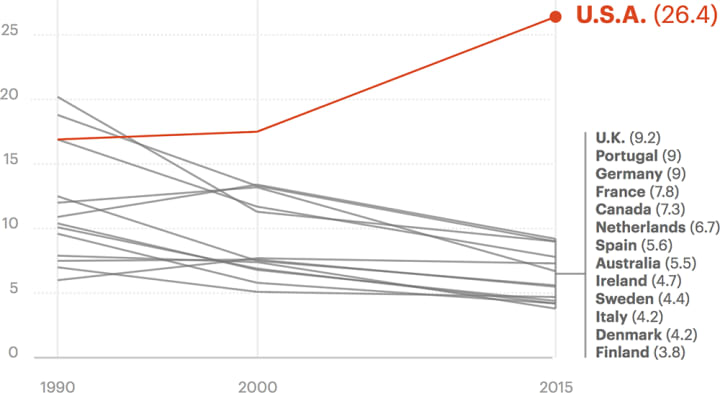
Deaths per 100,000 live births
A global trend is that maternal mortalities are on the decrease. Pregnancies, even ones complicated by things like diabetes, are safer than ever on a global scale.
Even in parts of the world that have notoriously bad health care, advances in women's health centers have resulted in more live births, less maternal deaths, and healthier babies. Even in parts of the world where birth control and abortion are illegal or hard to come by, maternal deaths and pregnancy-related deaths are slowing.
That is, of course, except for America. Maternal death in America is steadily on the rise, with around 900 women dying per year due to pregnancy issues. An additional 65,000 per year almost die - just like I did.
Statisticians say that this is the worst record in the developed world, including places like China, Japan, and all of Europe.
A woman giving birth in America is three times more likely to suffer from maternal death than a woman in Canada.
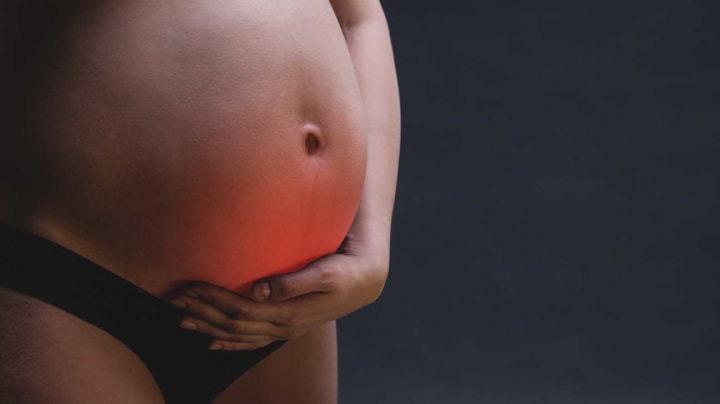
Maternal death in America is, proportionally, way more of a risk than maternal death in our neighbors up north. Just moving up to Canada while you're about to deliver gives you a better chance at getting out of pregnancy alive. Think about that for a second.
One of the most common reasons why people assume maternal death in America is on the rise is because of obesity, however, Canadians have very similar obesity rates to Americans. So, obesity-related complications are not what's killing women.
In Britain, a man has a higher chance of dying while his wife is pregnant than a woman has of facing maternal death. The people of Britain face the same health issues Americans do. Once again, the lie that Americans are in poorer health doesn't hold water.
Nearly 60 percent of all maternal death in America could be prevented.
I can't personally attest to this statement, but I have proof in the form of a study done by the Center for Disease Control. According to them, more than half of all maternal deaths and "close scrapes" could be avoided; doctors just don't care enough to do their jobs.
Doctors are supposed to prevent maternal death from happening; not to wait until she's bleeding out on the table and begging for help. Unfortunately, most doctors don't pay attention until things are critical.
In many cases, doctors don't take women's concerns about pain seriously. As a result, they overlook major symptoms that lead to complications that lead to death.
Laws currently allow doctors to turn away women based on "high risk pregnancies" in the US - and this is a contributing factor.
I called about 10 doctors that turned me away when I was pregnant. I ended up going through the pregnancy alone, without help, because doctors are given the legal right to refuse to help women with high risk pregnancies.
Many doctors refuse to help due to the fact that they worry about their "spotless records" or because they worry about malpractice suits. Unfortunately, the women who have high risk pregnancies are exactly the women who should be getting more help.
It would be a lot easier for moms-to-be to get the care they need if doctors would actually take time to look at them, watch over them, and not care about their "perfect track records" getting marred by a woman's complications. This would greatly reduce maternal death in America - but let's face it, it won't happen.
Doctors often will choose the baby's life over the mother's - regardless of what the mom wishes.
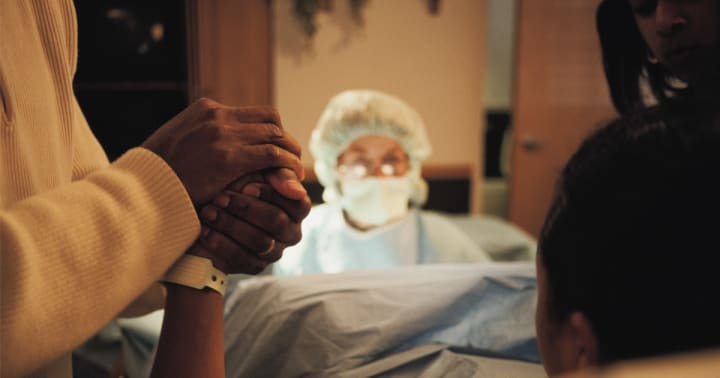
I wanted a C-section. I was denied that. Had they given me a C-section, they would have noticed that my uterus was all kinds of messed up, and I wouldn't have likely bled for seven months. My story also isn't that unusual in that respect.
Additionally, only six percent of all Title V grants go to pregnant women's healthcare - while 78 percent go to children. Medicaid, which pays for about 45 percent of all births, also stops covering maternal care within weeks - all the while giving infants long term benefits.
Statistics show that the vast majority of the healthcare watchdog and health improvement programs in hospitals tend to be geared towards babies rather than the mothers who carry them to term.
When you look at the numbers, it's clear that our policies are built on a belief that the mother isn't as important as the baby. However, having mothers dying while babies survive will only lead to orphans, families destroyed by death, and single parent households. Moms are just as important as babies.
When doctors stop caring about the mother's health and worry solely on the baby's, it's no surprise that maternal death in America is so high.
In America, OB-GYNs also might not have any training in maternal care.
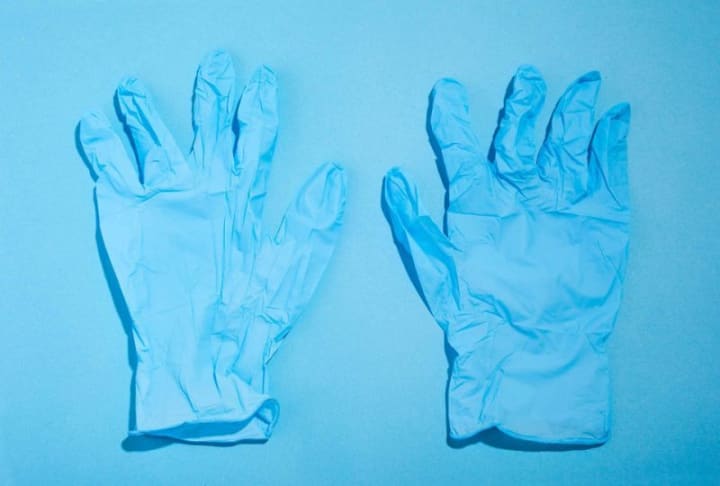
Surprise, surprise! Even medical school programs are so heavily focused on the baby portion of obstetric care that they seem to have forgotten that babies are carried in mothers who will take care of them.
At least one paper has noted that the disparity in training for caring for moms and babies may be one of the reasons why maternal death in America is as high as it is. After all, no training means that doctors won't even know what to do in cases where pregnancies go awry.
As late as 2012, doctors who wanted to become OB-GYNs didn't have to be trained in maternal care at all. It was all about ultrasounds, gestation, and learning how to "catch" babies.
Oh, and of all the hospitals in the US, only Manhattan's New York-Presbyterian/Columbia has a center that's devoted to offering programs to women with high-risk pregnancies. However, dozens exist for babies that may be born with complications.
Some terrifying statistics also show that maternal health is an afterthought in most cases.
One of the other unspoken contributors to maternal death in America is that doctors often don't tell women when they should seek health care for postpartum problems. Around one of four women will be given no advice on when they should call a doctor.
While every hospital will give advice on how to breastfeed, many don't give women any information on when they should seek help due to postpartum issues. Studies even showed it was an afterthought.
I realized something was wrong when I almost collapsed from blood loss in the middle of the subway, but assumed it'd get better over time. Who's to say other maternal deaths didn't happen from a similar assumption?
Does this scare you?
Good. It should.
The terrifying statistics behind maternal death in America are telling stories about how little we value maternal life, how little doctors are willing to do for their patients, and how totally lopsided our healthcare is.
These statistics also tell us stories of how many pregnancies women don't get to enjoy, the stark inhumanity that pregnant women are treated in many hospitals, and of how many families will be torn apart by the hands of negligent doctors.
Pregnant women are not cattle, nor should they be treated as vessels by the doctors who vowed to take care of them. They are mothers. They will be the mothers of your kids' school friends. They're your sisters, your neighbors, and your community. They are human, and doctors forgot that.
This is a women's issue, and it's time to hold doctors accountable for maternal death in America. It's time to force them to see high-risk pregnancies, to allow them to give mothers the options they need for healthcare, and to hold them accountable when they do neglect their patients to the point of death.
Until we start putting maternal care into the forefront of obstetrics, the rate of maternal death in America will continue to rise.
About the Creator
Alicia Springer
Mother of two. Personal trainer. Fitness is about determination, not age.
Reader insights
Outstanding
Excellent work. Looking forward to reading more!
Top insights
Compelling and original writing
Creative use of language & vocab
Easy to read and follow
Well-structured & engaging content
Expert insights and opinions
Arguments were carefully researched and presented
Eye opening
Niche topic & fresh perspectives
Heartfelt and relatable
The story invoked strong personal emotions
Masterful proofreading
Zero grammar & spelling mistakes
On-point and relevant
Writing reflected the title & theme






Comments (1)
I know that this is five years old, but its a powerful article. Maternal health has been in a concerning state for some time and I am not under the impression that it improved much going through covid (though that could be incorrect). While the data might be outdated, the story you tell, and the danger that exists is very real. I don't think many people can imagine having high risk pregnancies being turned away from care, when they are the very pregnancies that need the most care.